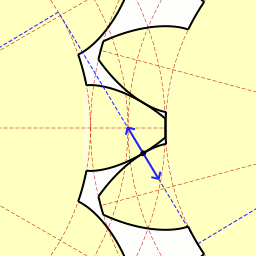Mechanization
Mechanization refers to the process of using machinery to carry out tasks that were once performed manually. This transformation is a fundamental aspect of the Industrial Revolution, which began in the late 18th century and has continued to evolve into the present day. Mechanization has had profound effects on agriculture, manufacturing, and many other sectors, leading to increased productivity, efficiency, and changes in labor patterns.
History[edit | edit source]
The roots of mechanization can be traced back to the Industrial Revolution, starting in Great Britain and spreading across the world. One of the earliest examples of mechanization was in the textile industry, where inventions such as the spinning jenny, the water frame, and the power loom revolutionized the production of cloth. These innovations significantly increased the speed and efficiency of textile manufacturing, reducing the need for manual labor and setting the stage for further mechanization in other industries.
In agriculture, mechanization began with the introduction of machines such as the cotton gin, invented by Eli Whitney in 1793, which mechanized the process of separating cotton fibers from their seeds. This was followed by the development of the mechanical reaper by Cyrus McCormick in 1831, which greatly increased the efficiency of harvesting crops. Over time, the introduction of tractors, combine harvesters, and other mechanized farming equipment has transformed agricultural practices, allowing for larger scale production with fewer laborers.
Impact[edit | edit source]
The impact of mechanization has been widespread, affecting economic, social, and environmental aspects of society. Economically, it has led to increased productivity and efficiency, contributing to economic growth and the development of new industries. However, it has also resulted in job displacement for workers in sectors heavily affected by automation.
Socially, mechanization has contributed to urbanization, as people moved from rural areas to cities in search of work in factories and other industrial settings. This shift has had profound effects on social structures, family life, and community dynamics.
Environmentally, mechanization has had both positive and negative impacts. On one hand, it has enabled more efficient use of resources and helped increase food production to meet the needs of a growing global population. On the other hand, the increased use of machinery and fossil fuels has contributed to environmental degradation and climate change.
Current Trends and Future Directions[edit | edit source]
Today, mechanization continues to evolve with advancements in technology, particularly through the integration of automation and artificial intelligence. In manufacturing, the concept of Industry 4.0 represents the next phase of mechanization, characterized by smart factories that use information and communication technologies to drive further automation and efficiency.
In agriculture, precision farming techniques that use GPS and remote sensing technology are making mechanization even more efficient, reducing waste and improving sustainability. However, the ongoing trend towards automation also raises questions about the future of work, the distribution of wealth, and the ethical implications of replacing human labor with machines.
Conclusion[edit | edit source]
Mechanization has been a driving force behind economic development and societal change. While it has brought about significant benefits in terms of productivity and efficiency, it also poses challenges that need to be addressed to ensure that the benefits of mechanization are distributed equitably and sustainably.
| This article is a stub. You can help WikiMD by registering to expand it. |
Search WikiMD
Ad.Tired of being Overweight? Try W8MD's physician weight loss program.
Semaglutide (Ozempic / Wegovy and Tirzepatide (Mounjaro / Zepbound) available.
Advertise on WikiMD
|
WikiMD's Wellness Encyclopedia |
| Let Food Be Thy Medicine Medicine Thy Food - Hippocrates |
Translate this page: - East Asian
中文,
日本,
한국어,
South Asian
हिन्दी,
தமிழ்,
తెలుగు,
Urdu,
ಕನ್ನಡ,
Southeast Asian
Indonesian,
Vietnamese,
Thai,
မြန်မာဘာသာ,
বাংলা
European
español,
Deutsch,
français,
Greek,
português do Brasil,
polski,
română,
русский,
Nederlands,
norsk,
svenska,
suomi,
Italian
Middle Eastern & African
عربى,
Turkish,
Persian,
Hebrew,
Afrikaans,
isiZulu,
Kiswahili,
Other
Bulgarian,
Hungarian,
Czech,
Swedish,
മലയാളം,
मराठी,
ਪੰਜਾਬੀ,
ગુજરાતી,
Portuguese,
Ukrainian
Medical Disclaimer: WikiMD is not a substitute for professional medical advice. The information on WikiMD is provided as an information resource only, may be incorrect, outdated or misleading, and is not to be used or relied on for any diagnostic or treatment purposes. Please consult your health care provider before making any healthcare decisions or for guidance about a specific medical condition. WikiMD expressly disclaims responsibility, and shall have no liability, for any damages, loss, injury, or liability whatsoever suffered as a result of your reliance on the information contained in this site. By visiting this site you agree to the foregoing terms and conditions, which may from time to time be changed or supplemented by WikiMD. If you do not agree to the foregoing terms and conditions, you should not enter or use this site. See full disclaimer.
Credits:Most images are courtesy of Wikimedia commons, and templates, categories Wikipedia, licensed under CC BY SA or similar.
Contributors: Prab R. Tumpati, MD



